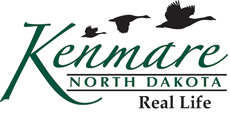Kenmare ND - Features
Real People. Real Jobs. Real Adventures.
Thanks for reading some of the latest features about area people and events.
To view every page and read every word of The Kenmare News each week,
subscribe to our ONLINE EDITION!
Is Kenmare ready for electric cars?...
What are the odds of people stopping in a community to recharge their electric vehicles when there is a major highway that runs between two nations and is equidistant to other charging stations?
12/17/19 (Tue)
What are the odds of people stopping in a community to recharge their electric vehicles when there is a major highway that runs between two nations and is equidistant to other charging stations?
The odds would be good and that’s why the Kenmare Community Development has discussed setting up one or more electric vehicle charging stations.
“My thinking is this will put us on a map,” said KCDC President Terry Froseth. “Literally, we’ll be on a map.”
The map he refers to shows all the recharging stations in
“There’s a lot of enthusiasm, but funding is the key,” Froseth said. “It would cost $60,000 for level 3.”
That funding would most likely come from
When the money becomes available is anybody’s guess. The Department of Environmental Quality didn’t return messages left at its
The way Froseth describes it, a grant program could be set up for someone who might want to establish a level 2 station which costs about $3,500 as opposed to $60,000.
Froseth said the KCDC could make a good case for level 2 and plan for at least one level 3 charging station.
Income wouldn’t come so much from the electricity used for the charge, but would be generated from selling parking spaces.
Heidi Haugen-Grohs, who is secretary of the KCDC, is the member services manager for Burke-Divide Electric.
She said Burke-Divide will install charging stations at all three of its locations in Kenmare, Columbus and Crosby if Burke-Divide purchases an EV.
“We’ve been discussing it a couple of years,” she said. “There are a number of co-ops across the state that have them and take them to trade shows to showcase electricity.”
Unlike the KCDC, however, she doubts any of them would be available for public use because the concept is to have the charging ports placed inside Burke-Divide buildings.
While at a convention in
She visited with a Tesla representative about it and learned Tesla had been testing its vehicles in
The Tesla rep told Grohs that depending on how cold it is, there’s an approximate 40 percent reduction in range during cold months.
Grohs sees EVs becoming more popular as the battery storage technology improves.
Burke-Divide has priced a Chevrolet Bolt for two reasons, it’s affordable and most co-ops use the Bolt in their presentations.
For individuals, they can get a portion of the sticker price knocked off with a tax credit. Grohs said Burke-Divide isn’t eligible, but individual consumers are.
Right now, The IRS tax credit is for $2,500 to $7,500 per new EV purchased for use in the
One of the co-ops in the state, Cass County Electric, is working with the
Grohs believes Kenmare and Burke-Divide should get in on the cutting edge of this.
“I kind of think we have to be,” she said. “We should be leaders, especially with the amount of traffic from
During a recent KCDC meeting, she said there was discussion about where to place recharging stations.
The consensus was the Farmers Union Oil convenience store since most travelers stop there anyway. Another was to put one in the downtown square and while their vehicle is charging, motorists can browse and shop in the downtown Kenmare stores. Froseth suggested it might be a way to re-purpose the Freeman Oil location, which is now vacant. The Quilt Inn would also be a good location because travelers could “plug in” during overnight stays.
“What happens when EVs become prominent,” Grohs said? “That will create a demand and how do we supply that demand. These are things that we have to talk about.”
And, as a power supplier, how will it affect Burke-Divide members? Will the co-op allow its members to recharge for free or will special rates have to be applied? Will the general public be allowed to use Burke-Divide facilities?
All these questions need to be answered before the industry really does emerge in
There are currently about 200 EVs on
There’s only one way to get those questions answered.
“We like to try things out,” Grohs said. “And we hope that when our members have questions, they can come to us.”
They might even be able to get a short-term lease on the Bolt... Read EVERY WORD on EVERY PAGE of The Kenmare News by subscribing--online or in print!


